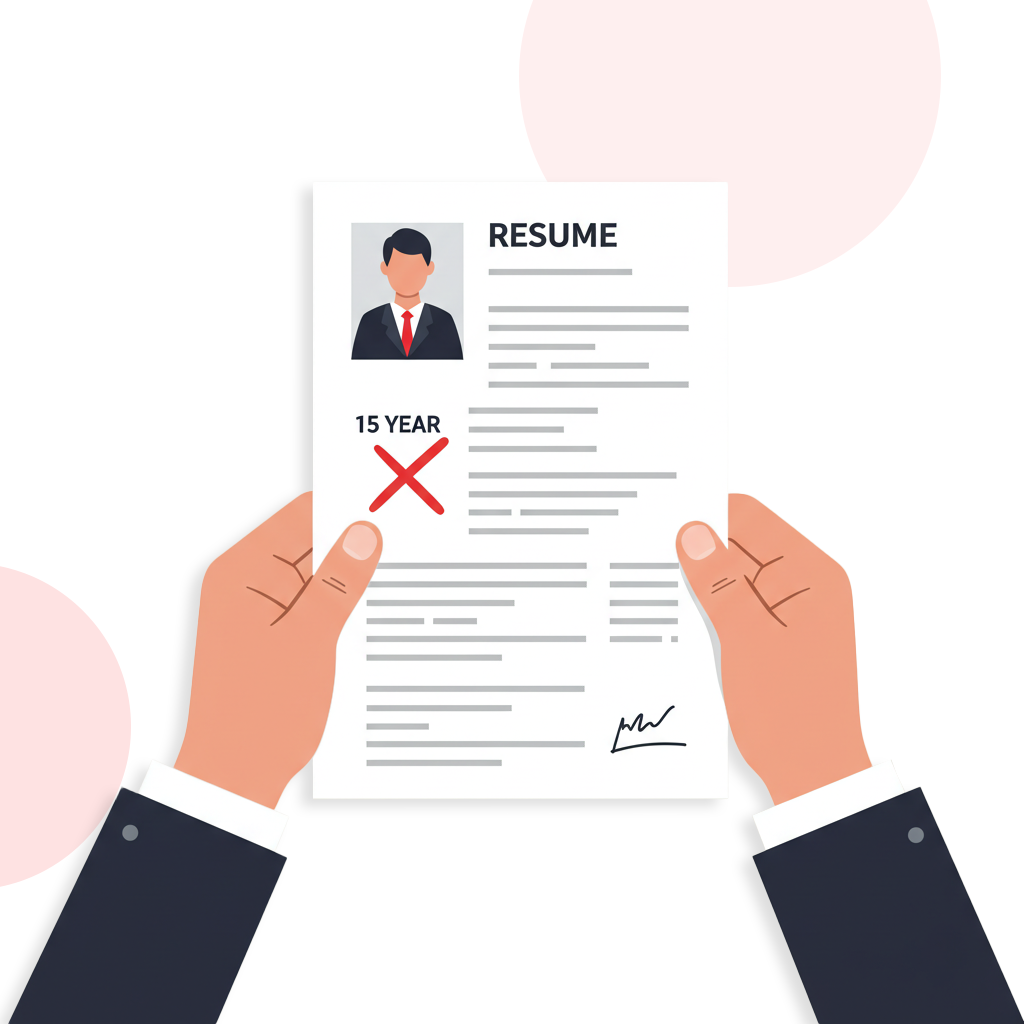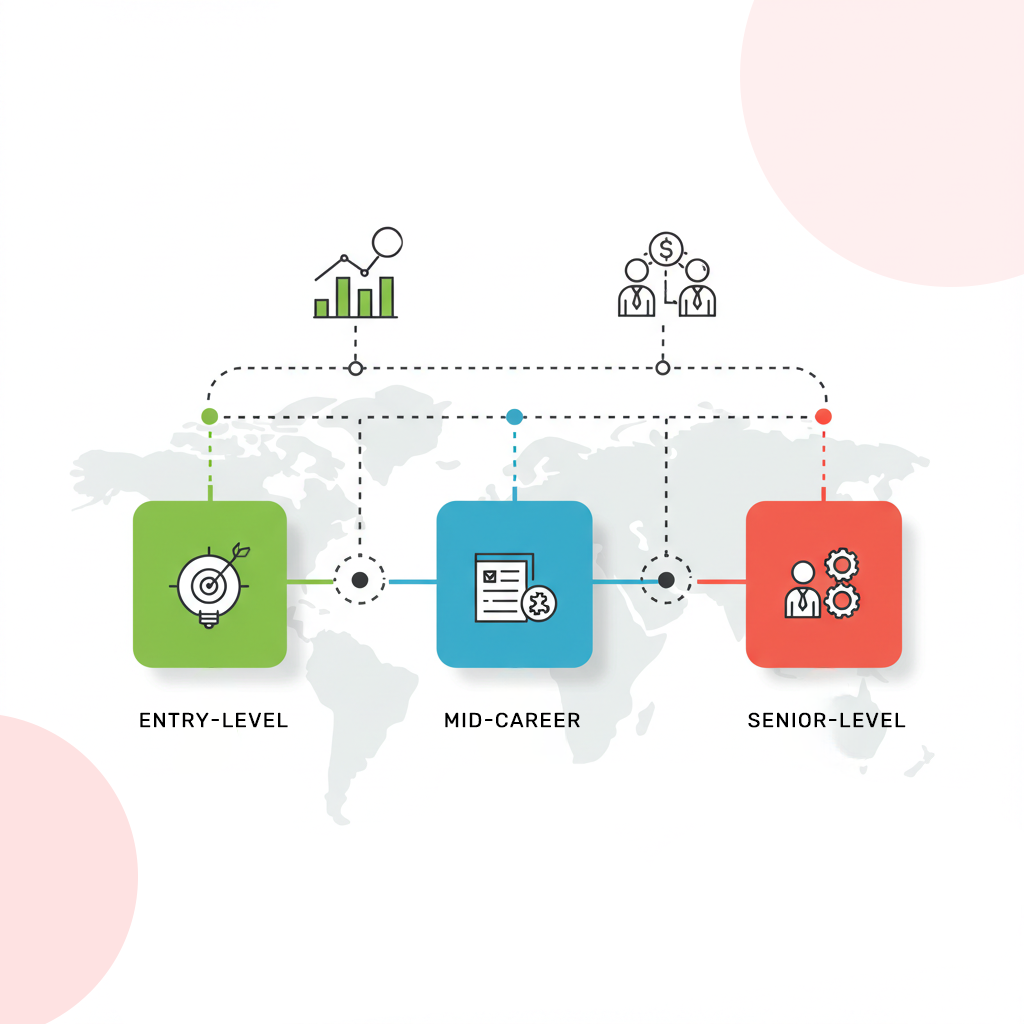Remember this guideline: including only the last 12-15 years of your work experience might be the most impactful thing you do for your resume. You must always present the most relevant and up-to-date skills and skip unnecessary details that may no longer be applicable to today’s job market.
As always, there are exceptions. Sometimes, listing older experiences may be beneficial. So, let’s explore the general rules and situations when it’s worth breaking them.
The Rule: Keep It to the Last 10-15 Years
Let’s see: why is the rule set to exactly 15 years? Because employers care most about your recent experience. They will rarely be interested in your professional beginnings unless they are truly exceptional. What you’ve achieved in the last decade is the best indicator of what you can do now.
Another reason why you shouldn’t go further back is that industries evolve rapidly in this digital age. The skills you had 20+ years ago are most likely outdated. Presenting only the most recent experience will keep your resume readable, too. Don’t forget that hiring managers don’t have time to go through your entire professional biography. These are situations when it’s wise to stick to the 15-year rule:
✅ When applying for mid-level positions, which require 3-10 years of experience
✅ When your older experience is in a different field and not relevant to your target job
✅ When past roles don’t add much value to your current career path
Example: if you’re a marketing manager applying for a senior role, there’s no need to include your first job as a retail cashier from 20 years ago.
The Exceptions: When to Include 15+ Years Old Experience
Some professions benefit from older work history:
✅ If you’re an executive or senior professional, such as a CEO, you’ll need to showcase leadership over decades.
✅ Academics, researchers, and scientists should also list their early contributions as they often remain relevant in these niches.
✅ If a past job is highly relevant to the position you’re applying for, list it even if it’s older.
✅ If you have a big career gap, you’ll need to provide context for older roles. Let’s say a former teacher is transitioning back into education after a career change. Naturally, they will include past teaching experience, even if it’s over 15 years old.
How to Summarize Older Experience (without Listing Every Detail)
Does your resume fall under the exceptions list and allow you to list experiences that go more than 15 years back? Great, but how do you list it? Creating a dedicated “Earlier Experience” section is one way to do it. If your older roles add value but aren’t the main focus, you can create a short summary section for them. There’s no need to list each role separately. Here are some examples of what you can write in that section:
- Held various sales and leadership roles in the tech industry, contributing to major client acquisitions and revenue growth.
- Developed early-stage IT solutions that led to industry-wide innovations.
- Managed large-scale marketing campaigns for Fortune 500 companies.
Don’t be afraid to be somewhat generic in these descriptions. As long as they are impressive, the hiring manager will ask about them during the interview. This section should not be overloaded with too many specifics.
Another option is to remove full job entries but mention the key highlights in the summary or achievements sections. Here’s an example of a summary that mentions an older job:
Finally, you can include a separate “Career Highlights” section. There, you can include a few older but highly relevant achievements.
How Far Back to Go Based on Career Stage
The approach to resume writing is different for entry-level professionals, senior executives, and career changers.
Entry-level (0-2 years of experience)
If you’re an entry-level candidate, the general 10-15 years rule means nothing to you. Feel free to simply ignore it. Your focus should be on the following points:
Internships and apprenticeships
First jobs related to your industry
Relevant coursework and academic projects
Freelance work or volunteer experience (if applicable to the role)
But there’s a trap! Entry-level candidates feel like they have to add everything to their document just to achieve the desired resume length. Remember: Listing every part-time or unrelated job is not okay unless you can explain it using transferable skills. You should also avoid adding excessive detail to short-term internships.
Here’s an example of a strong Experience section for an entry-level candidate who is applying for a Marketing Intern position:
- Assisted in developing social media campaigns, increasing engagement by 20%.
- Conducted market research to refine target audience strategies.
- Created blog content that attracted 5,000+ monthly visitors.
If you lack formal work experience, don’t despair - you can mention projects, coursework, or extracurricular and volunteering activities. Job relevance must be your ultimate goal at all times.
Mid-career (3-10 years of experience)
If you ask job applicants, they find mid-career resumes easiest to write. This is what the resume should focus on:
Your last 10-15 years of work experience
Roles that show career growth and increasing responsibility
Key accomplishments for each role
If you feel like you got carried away, there are some things you can edit out:
Your resume doesn’t have to include early entry-level jobs that no longer add value to your career path.
Avoid listing irrelevant roles from unrelated industries.
Unless internships or college projects are super-relevant, don’t list them in a resume of this level.
If you started as an entry-level employee in the same company and got promoted, you can group multiple positions under one listing. That will save you space. Like this:
X Company
Senior Software Engineer (2021-Present)
Software Engineer (2018-2021)
Junior Developer (2016-2018)
Senior level (10+ years of experience)
This is the level at which the problems begin. With so much experience, you might be tempted to include more than necessary. You’ll need to trim down this resume section to the most recent and relevant experience so that the potential employer won’t get confused with too many details. In essence, your resume should convey your leadership, strategy, and major achievements.
-
 Executive and leadership roles that demonstrate your expertise
Executive and leadership roles that demonstrate your expertise
-
 Career-defining projects, mergers, and innovations
Career-defining projects, mergers, and innovations
-
 A summary of early roles instead of a complete list with details
A summary of early roles instead of a complete list with details
If an older role is highly relevant, you can list it. However, we advise you to keep the details minimal to avoid any potential age bias. Here’s one way to summarize older experience:
- Held progressive leadership roles in Fortune 500 companies.
- Led major business transformation initiatives.
- Managed teams of 50+ employees across multiple regions.
Career changers
When transitioning to a new industry, the focus is on transferable skills. Listing every job chronologically is not necessary. That’s why the hybrid resume format works best for career changers. It’s skills-based rather than purely chronological.
The point of a career-change resume is to emphasize the skills you gained in previous roles that apply to your newly chosen career path. You can include any relevant certifications, coursework, or side projects to bridge the gap in experience.
Avoid listing your unrelated jobs if you can’t draw transferable skills from them. If there are any gaps in the career section, provide some explanation.
Let’s say a teacher is transitioning to instructional design. They can write like this:
Key Skills:
- Curriculum Development — E-Learning Course Design
- Classroom Technology — Learning Management Systems
- Student Engagement — User Experience in Learning Platforms
Relevant Experience:
High School Teacher | 2015-2023
- Designed interactive lessons that improved student engagement by 40%
- Integrated EdTech tools, leading to improved learning outcomes
If the career-change resume includes past experiences without making it seem outdated, you can use the summary statement to tie everything together.
Education and Certifications: How Far Back They Should Go
This section plays an important role in your resume. But how much detail should you include, and how far back should a resume go when it comes to this block? That depends on your career stage. Let’s discuss the main issues to give you a precise answer!
Graduation dates
You can include graduation dates in the following cases:
If you’re a recent graduate with up to 5 years out of school, but exclude high school details if you have (or are pursuing) a college degree, even if it is still within the 5-year limit
If the degree is directly related to your job, no matter when you earned it
If the employer specifically requested graduation details
If you graduated over 10 years ago, it’s best not to include graduation dates so you’ll avoid age bias. Don’t include the dates if the degree isn’t relevant to your current career. Another situation in which graduation dates should be avoided is when you have extensive work experience that overshadows education.
Certifications and training
Not all certifications hold indefinite value. Some remain relevant throughout your career, and you can include them regardless of the dates. Others, on the other hand, become outdated due to industry advancements, and you should remove them. You should also avoid listing basic certifications that are no longer impressive.
Keep certifications in these cases:
When they are currently relevant to your job
When they are required in your industry
If they are active and haven’t expired
For example, these are the types of certifications you could list:
Project Management Professional (Active)
These are the kinds to remove:
Microsoft Office Specialist Certification (2008)
CPR Certification (unless you’re applying for a healthcare or safety-related position)
Overview
Writing the perfect resume requires some skill. It isn’t easy to reach the balance between detail and relevance. The resume length and depth should reflect your experience level and provide only highly relevant information. Hyper-optimization is one of the top resume trends this year. So here is a valuable tip from the best resume writing services: consider creating a master file with all of your professional experience listed, and work from there, fine-tuning your resume to different applications and adding or removing your jobs as their relevance changes. And if you need help with your resume to craft the perfect job application for you, Resumeble is the ideal choice!




